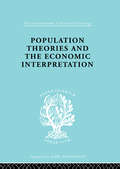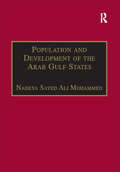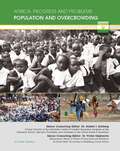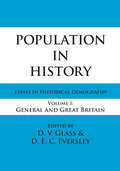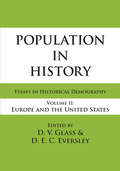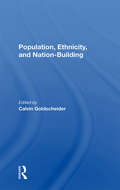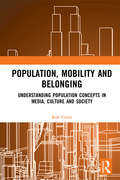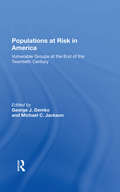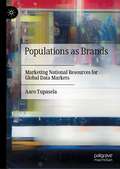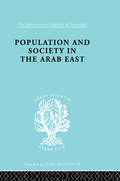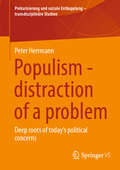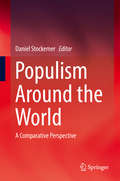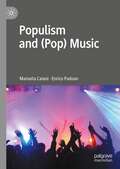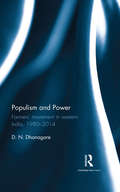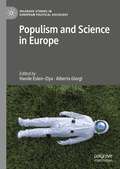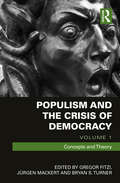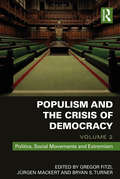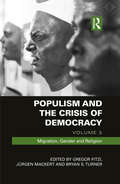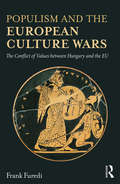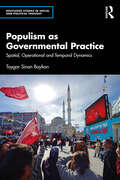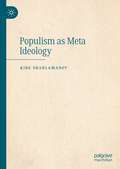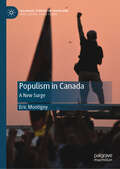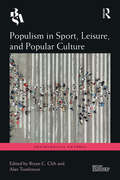- Table View
- List View
Population Theories and their Economic Interpretation (International Library of Sociology)
by Sydney H. CoontzFirst published in 1998. Routledge is an imprint of Taylor & Francis, an informa company.
Population and Development of the Arab Gulf States: The Case of Bahrain, Oman and Kuwait
by Nadeya Sayed MohammedThis thought-provoking study measures and critically examines the effects that an average population growth rate of 2.8% could have on the development of the Arab Gulf States. It questions the ability of Gulf governments to continue providing relatively high standards of education, health and employment under conditions of rapid population growth, an undiversified economic base, and a tribal political framework.  Within this context, population growth is identified as one important variable that hinders long-term development. The book will appeal to all those interested in the Middle East, demography, development and sociology.
Population and Overcrowding (Africa: Progress and Problems)
by Tunde ObadinaAfrica is the worlds poorest continent, and it also has the worlds fastest-growing population. Many observers have concluded that overpopulation is a root cause of Africas poverty, and that if the continent is ever to emerge from underdevelopment its rapid population growth will have to be slowed. This book examines those assertions, offering a wealth of statistical and other evidence to suggest that the link between African poverty and the size of Africas population is by no means definitive. The book also examines the important demographic trendssuch as rapid urbanization, elevated mortality rates from the HIV/AIDS epidemic, and continued high fertilitythat will help shape African societies in the decades to come.
Population and Society
by Jr. Poston Dudley L. Bouvier Leon F.Population and Society: An Introduction to Demography is an ideal text for undergraduate, as well as graduate, students taking their first course in demography. It is sociologically oriented, although economics, political science, geography, history, and the other social sciences are also used to inform the materials. Although the emphasis is on demography, the book recognizes that, at the individual level, population change is related to private decisions, especially in relation to fertility, but also to mortality and migration. The text thus considers in some detail the role of individuals in population decision making. At the level of countries, and even the world, changes in population size have an important effect on the environmental and related challenges facing all of the world's inhabitants. Therefore, attention is paid to the broad implications of population growth and change.
Population in History: Essays in Historical Demography, Volume I: General and Great Britain
by D. V. Glass D. E. C. EversleyThis large-scale comparative endeavor, complete in two volumes, reflects increasing concern with the population factor in economic and social change worldwide. Demographers, on their side, have been focusing on history. In response to this, Population in History represents the work of two practitioners that have begun to work together, using their combined approaches in an attempt to assess and account for population growth experienced by the West since the seventeenth century.There is a long record of interest in the history of population. But the interest now displayed is likely to be both more persistent and far more fruitful in its consequences. New studies have been initiated in many countries. And because the studies are more informed and systematic than many of those of earlier periods, they are already provoking the further spread of research. A much more positive part is now also being played by national and international associations of historians and demographers. It is not unlikely that, within the next fifteen or twenty years, the main outlines of population change in the seventeenth and eighteenth centuries will be firmly established for much of Europe.Previous research has tended to appear in specialist journals and academic publications. This volume is intended to provide a more easily accessible publication. It has been thought appropriate to include some earlier work, both because of its intrinsic interest and because it provided the background and part of the stimulus to the later research. Of the twenty-seven contributions to this outstanding volume, seven are unabridged reprints of earlier work; the remaining contributions are either entirely new or represent substantial revisions of work published elsewhere.
Population in History: Essays in Historical Demography, Volume II: Europe and United States
by Hugh DaunceyThis large-scale comparative endeavor, complete in two volumes, reflects increasing concern with the population factor in economic and social change worldwide. Demographers, on their side, have been focusing on history. In response to this, Population in History represents the work of two practitioners that have begun to work together, using their combined approaches in an attempt to assess and account for population growth experienced by the West since the seventeenth century.There is a long record of interest in the history of population. But the interest now displayed is likely to be both more persistent and far more fruitful in its consequences. New studies have been initiated in many countries. And because the studies are more informed and systematic than many of those of earlier periods, they are already provoking the further spread of research. A much more positive part is now also being played by national and international associations of historians and demographers. It is not unlikely that, within the next fifteen or twenty years, the main outlines of population change in the seventeenth and eighteenth centuries will be firmly established for much of Europe.Previous research has tended to appear in specialist journals and academic publications. This volume is intended to provide a more easily accessible publication. It has been thought appropriate to include some earlier work, both because of its intrinsic interest and because it provided the background and part of the stimulus to the later research. Of the twenty-seven contributions to this outstanding volume, seven are unabridged reprints of earlier work; the remaining contributions are either entirely new or represent substantial revisions of work published elsewhere.
Population, Ethnicity, And Nation-building
by Calvin GoldscheiderThis volume focuses on the linkages between ethnicity and population processes in the context of nation-building. Using historical and contemporary illustrations in a variety of countries, parts of this complex puzzle are scrutinized through the prisms of sociology, history, political science, anthropology, and demography Themes of ethnic group formation and transformation, persistence and assimilation, demographic transitions and convergences, and the processes of political mobilization and economic development are described and compared. Case studies from Southeast Asia, China, Africa, Brazil, Israel, the former Soviet Union, Canada, Europe, and the United States are presented by leading scholars. The examples illustrate the diversity of contexts that connect population, ethnicity, and nation-building, raising new questions and comparative problems. The importance of ethnic conflict for issues of inequality and group disadvantage in the emerging societies of Asia, Africa, and the Middle East; in the politics of race and immigration in western societies; and in European and American history emerges from the research. The multidisciplinary emphasis addresses core themes of ethnicity and nation-building in comparative perspectives.
Population, Mobility and Belonging: Understanding Population Concepts in Media, Culture and Society
by Rob CoverIn a world of increasing mobility and migration, population size and composition come under persistent scrutiny across public policy, public debate, and film and television. Drawing on media, cultural and social theory approaches, this book takes a fresh look at the concept of ‘population’ as a term that circulates outside the traditional disciplinary areas of demography, governance and statistics—a term that gives coherence to notions such as community, nation, the world and global humanity itself. It focuses on understanding how the concept of population governs ways of thinking about our own identities and forms of belonging at local, national and international levels; on the manner in which television genres fixate on depictions of overpopulation and underpopulation; on the emergence of questions of ethics of belonging and migration in relation to cities; on attitudes towards otherness; and on the use by an emergent ‘alt-right’ politics of population in ‘forgotten people’ concepts. As such, it will appeal to scholars of sociology, geography and media and cultural studies with interests in questions of belonging, citizenship and population.
Population-Based Survey Experiments
by Diana C. MutzPopulation-based survey experiments have become an invaluable tool for social scientists struggling to generalize laboratory-based results, and for survey researchers besieged by uncertainties about causality. Thanks to technological advances in recent years, experiments can now be administered to random samples of the population to which a theory applies. Yet until now, there was no self-contained resource for social scientists seeking a concise and accessible overview of this methodology, its strengths and weaknesses, and the unique challenges it poses for implementation and analysis.Drawing on examples from across the social sciences, this book covers everything you need to know to plan, implement, and analyze the results of population-based survey experiments. But it is more than just a "how to" manual. This lively book challenges conventional wisdom about internal and external validity, showing why strong causal claims need not come at the expense of external validity, and how it is now possible to execute experiments remotely using large-scale population samples.Designed for social scientists across the disciplines, Population-Based Survey Experiments provides the first complete introduction to this methodology.Offers the most comprehensive treatment of the subjectFeatures a wealth of examples and practical adviceReexamines issues of internal and external validityCan be used in conjunction with downloadable data from ExperimentCentral.org for design and analysis exercises in the classroom
Populations At Risk In America: Vulnerable Groups At The End Of The Twentieth Century
by George J Demko Michael C. JacksonAs this century draws to a close and the new one approaches, the United States is still struggling with serious and persistent social problems. These troubling dilemmas, including poverty, homelessness, discrimination, and severe inequity, afflict some subgroups of the population more than others, and it is the plight of these at-risk groups—childr
Populations as Brands: Marketing National Resources for Global Data Markets
by Aaro TupaselaIn Populations as Brands Aaro Tupasela extends the fields of critical data studies and nation branding into the realm of state controlled biobanking and healthcare data. Using examples from two Nordic countries - Denmark and Finland – he explores how these countries have begun to market and brand their resources using methods and practices drawn from the commercial sector. Tupasela identifies changes during the past ten years that suggest that state collected and maintained resources have become the object of valuation practices. Tupasela argues that this phenomenon constitutes a novel form of nation branding in which relations between the states, individuals and the private sector are re-aligned. The author locates the historical underpinnings of population branding in the field of medical genetics starting in the early 1960s but transforming significantly during the 2010s into a professional marketing activity undertaken at multiple levels and sites. In studying this recent phenomenon, Tupasela provides examples of how marketing material has become increasingly professional and targeted towards a broader audience, including the public. The book will be of particular interest to scholars of critical data studies and nation branding, as well as students of science and technology studies, sociology and marketing.
Populatn Soc Arab East Ils 68 (International Library of Sociology #16)
by Gabriel BaerFirst published in 1998. Routledge is an imprint of Taylor & Francis, an informa company.
Populism - distraction of a problem: Deep roots of today's political concerns (Prekarisierung und soziale Entkopplung – transdisziplinäre Studien)
by Peter HerrmannThis book questions the mainstream interpretation of the current political shifts as a move to ultra-conservative and even fascist politics, changing the polities of the Western democracies that can be overcome by “reclaiming democracy”. Instead of following this path, the present work analyses these developments as extreme consequence that emerged from the individualist and short-sighted understanding of rationality that coined the enlightenment and had been translated into an institutionalist take on democracy. Such view, while accepting the common interpretation of a dramatic and extremely dangerous development, goes further: it emphasises the need to question the pathway of modernisation: Looking at what is hidden by the eclipse of reason encourages also to look for a new societal model, asking for a real public, transcending current strives for publicity. As such, it is an important contribution to debates on precarity and a one-sided understanding of Human Rights. Scholars of political science and political philosophy will be interested in the work as it will be of interest for those who are engaging in oingoi8ng political debates.
Populism Around the World: A Comparative Perspective
by Daniel StockemerThis book provides a global overview of populist actors and strategies around the globe from a comparative perspective. By presenting six country studies on the United States, France, Poland, Turkey, the Philippines and Argentina, the contributors analyze how parties from both the radical left and right use a populist discourse combining people-centrism, anti-elitism, and the exclusion of certain population cohorts from the national community. They illustrate how populist actors mobilize and persuade citizens by using simple and slogan-based language and charismatic leadership while offering simple solutions to complex problems.Each case study describes the history of populism in the respective country, current populist actors, the strategies these parties and movements employ, and how successful these tactics are within the population. These case studies are embedded within two theoretical chapters that link the cases to the theoretical and empirical literature on populism. This timely book will appeal to anyone interested in understanding the current enormous appeal of populist movements around the globe.
Populism and (Palgrave Studies in European Political Sociology)
by Manuela Caiani Enrico PadoanThis book launches a proposal: to fill some empirical and theoretical gaps that presently exists in populism studies by looking at the potential nexus between populist phenomena and popular culture. It provides a detailed account of the multiple mechanisms linking the production of pop music (as a form of popular culture) to the rise and reproduction of populism. The authors use a case study of Italy to interrogate these mechanisms because of its long-lasting populist phenomena and the contextual importance of pop music. The book’s mixed-methods strategy assesses three different aspects of the potential relationship between pop music and populist politics: the cultural opportunity structure generated and reproduced by the production of music, the strategies political actors use to exploit music for political purposes, and, crucially, the ways fans and ordinary citizens understand the relationship between pop music and politics, and subsequent debates and identities. Moving from the case study, the book in its last chapter offers a more general understanding of the associations between pop music and populism.
Populism and Power: Farmers’ movement in western India, 1980--2014
by D. N. DhanagareThis book traces the entire trajectory of the farmers’ movement in Western India, especially Maharashtra, from the 1980s to the present day. It reveals the fundamental contradictions between populism as an ideology and as political power within the democratic state structure. The volume highlights the ideologies of the movement; its emergence in the wake of a perceived agrarian crisis; how it conflates economics and populism; the role of leadership; stages of development from grassroots agitations rooted in civil society to the attempts to create space within structures of democratic politics; the eventual formation of a separate political party and consequent implications. It maps the linkages between populist ideology and mass participation, and their contested successes and failures in the domain of electoral politics. Further, the author underlines the effectiveness of the movement in addressing class and gender equations in the region. <P><P>Rich in primary archival sources and informed field studies, this book will interest scholars and researchers of agrarian economy, rural sociology, and politics, particularly those concerned with social movements in India.
Populism and Science in Europe (Palgrave Studies in European Political Sociology)
by Hande Eslen-Ziya Alberta GiorgiThis book provides the first systematic and comparative analysis of the intersections of populism and science in Europe, from the perspective of political sociology.Populism is the object of rich scholarly debate over its definition and the best way to approach its study. But until now, little attention has been paid to the relationships between populism and science. Recently, the Covid-19 crisis has exposed the contradictions in this relationship, and this book combines an analysis of the theoretical aspects of the relationship between populism and science with rigorous empirical research.The theoretical perspectives show populism as a thin-ideology, as discourse and performance, and as a political logic, consider both right-wing and left-wing populism, and focus on leaders as well as citizens. The book also offers an overview of controversies within different fields of ‘science’, including case studies on food science, climate change, vaccination, gender theory, COVID-19, and environmental issues.The book will be of interest to scholars and students of a number of social science disciplines, including political sociology, political science and political psychology.
Populism and the Crisis of Democracy: Volume 1: Concepts and Theory (Routledge Advances in Sociology)
by Bryan S. Turner Juergen Mackert Gregor FitziThere is no threat to Western democracies today comparable to the rise of right-wing populism. While it has played an increasing role at least since the 1990s, only the social consequences of the global financial crises in 2008 have given it its break that led to UK’s ‘Brexit’ and the election of Donald Trump as US President in 2016, as well as promoting what has been called left populism in countries that were hit the hardest by both the banking crisis and consequential neo-liberal austerity politics in the EU, such as Greece and Portugal. In 2017, the French Front National (FN) attracted many voters in the French Presidential elections; we have seen the radicalization of the Alternative für Deutschland (AfD) in Germany and the formation of centre-right government in Austria. Further, we have witnessed the consolidation of autocratic regimes, as in the EU member states Poland and Greece. All these manifestations of right-wing populism share a common feature: they attack or even compromise the core elements of democratic societies such as the separation of powers, protection of minorities, or the rule of law. Despite a broad debate on the re-emergence of ‘populism’ in the transition from the twentieth to the twenty-first century that has brought forth many interesting findings, a lack of sociological reasoning cannot be denied, as sociology itself withdrew from theorising populism decades ago and largely left the field to political sciences and history. In a sense, Populism and the Crisis of Democracy considers itself a contribution to begin filling this lacuna. Written in a direct and clear style, this set of volumes will be an invaluable reference for students and scholars in the field of political theory, political sociology and European Studies. This volume Concepts and Theory offers new and fresh perspectives on the debate on populism. Starting from complaints about the problems of conceptualising populism that in recent years have begun to revolve around themselves, the chapters offer a fundamental critique of the term and concept of populism, theoretically inspired typologies and descriptions of currently dominant concepts, and ways to elaborate on them. With regard to theory, the volume offers approaches that exceed the disciplinary horizon of political science that so far has dominated the debate. As sociological theory so far has been more or less absent in the debate on populism, only few efforts have been made to discuss populism more intensely within different theoretical contexts in order to explain its dynamics and processes. Thus, this volume offers critical views on the debate on populism from the perspectives of political economy and the analysis of critical historical events, the links of analyses of populism with social movement mobilisation, the significance of ‘superfluous populations’ in the rise of populism and an analysis of the exclusionary character of populism from the perspective of the theory of social closure.
Populism and the Crisis of Democracy: Volume 2: Politics, Social Movements and Extremism
by Bryan S. Turner Juergen Mackert Gregor FitziThe contributions to this volume Politics, Social Movements and Extremism take serious the fact that populism is a symptom of the crisis of representation that is affecting parliamentary democracy. Right-wing populism skyrocketed to electoral success and is now part of the government in several European countries, but it also shaped the Brexit campaign and the US presidential election. In Southern Europe, left-wing populism transformed the classical two parties systems into ungovernable three fractions parliaments, whereas in Latin America it still presents an instable alternative to liberal democracy. The varying consequences of populist mobilisation so far consist in the maceration of the established borders of political culture, the distortion of legislation concerning migrants and migration, and the emergence of hybrid regimes bordering on and sometimes leaning towards dictatorship. Yet, in order to understand populism, innovative research approaches are required that need to be capable of overcoming stereotypes and conceptual dichotomies which are deeply rooted in the political debate. The chapters of this volume offer such new theoretical strategies for inquiring into the multi-faceted populist phenomenon. The chapters analyse its language, concepts and its relationship to social media in an innovative way, draw the con - tours of left- and right-wing populism and reconstruct its shifting delimitation to political extremism. Furthermore, they value the most significant aftermath of populist mobilisation on the institutional frame of parliamentary democracy from the limitation of the freedom of press, to the dismantling of the separation of powers, to the erosion of citizenship rights. This volume will be an invaluable reference for students and scholars in the field of political theory, political sociology and European Studies.
Populism and the Crisis of Democracy: Volume 3: Migration, Gender and Religion (Routledge Advances In Sociology Ser.)
by Bryan S. Turner Juergen Mackert Gregor FitziThe contributions to this volume Migration, Gender and Religion bring together empirically grounded and theoretically sophisticated case studies of populist responses to what are perceived to be the threats to national survival and sovereignty from ‘uncontrolled’ immigration. The demographic context – declining fertility rates and ageing populations – promotes the belief that high Muslim fertility rates are material evidence of an Islamic threat to the West, to national cohesion and particularly to the safety and dignity of the women of the host community. Consequently, gender plays an important part in populist ideology, but populist attitudes to gender are often contradictory. Populist movements are often marked by misogyny and by policies that are typically anti-feminist in rejecting gender equality. The traditional family with a dominant father and submissive mother is promoted as the basis of national values and the remedy against social decline. The obsession with women in the public domain points to a crisis of masculinity associated with unemployment, the impact of austerity packages on social status, and the growth of pink collar employment. Inevitably, religion is drawn into these political debates about the future of Western societies, because religion in general has seen the family and mothers as essential for the reproduction of religion. Christendom has been identified by populists as providing the ultimate defence of the borders of European civilisation against Islam, despite the fact that church leaders have often defended and welcomed outsiders in terms of Christian charity. Once more Christian Europe is the Abendland standing in defiance of a threatening and subversive Morgenland. This volume will be an invaluable reference for students and scholars in the field of political theory, political sociology and European Studies.
Populism and the European Culture Wars: The Conflict of Values between Hungary and the EU
by Frank FurediConcern and hostility towards populism has become a distinctive feature of contemporary political culture. In Europe such concerns are frequently directed at Eurosceptics, whose opposition to the European Union is often portrayed as a cultural crime. Ancient anti-democratic claims about the gullibility, ignorance and irrationality of the masses are frequently recycled through the anti-populist condemnation of people who vote the wrong way. This book argues that the current outburst of anti-populist anxiety is symptomatic of a loss of faith in democracy and in the ability of the demos to assume the role of responsible citizens. Distrust of the people and of parliamentary sovereignty is reinforced by the concern that, on its own, liberal democracy lacks the normative foundation to inspire the loyalty and affection of ordinary citizens. Through focusing on the conflict between the European Union’s Commission and the Government of Hungary, this book explores contrasting attitudes towards national sovereignty, popular sovereignty and the question of tradition and the past as the main drivers of the culture war in Europe.
Populism as Governmental Practice: Spatial, Operational and Temporal Dynamics (Routledge Studies in Social and Political Thought)
by Toygar Sinan BaykanPopulism as Governmental Practice illustrates how populism functions as a phenomenon of power and draws attention to the brighter and darker consequences of populist rule for ordinary people across the world via bottom-up analyses of populist experiences of government in remarkably different national contexts including Turkey, Venezuela, Greece, India, Philippines, Egypt, and the United States.By proposing an understanding of politics that is broader than the one embraced in current populism research, it focuses on a realm stretching beyond the electoral high politics of ideas/ideologies, discourses, public performances/styles, and mobilization efforts. The book theorizes populism as a responsive political/governmental practice in congruence with the material and symbolic expectations of populist audiences and analyses it as a rich praxis of governing people and things that is blurring the boundaries between public and the private as well as formal and the informal while embracing swiftness in temporal terms.Through an interpretive perspective focusing on the bounded rationalities and moral economies embedded in the populist rule and popular obeyance to it, this book would appeal to researchers and students of politics and its sub-disciplines as well as to the non-expert audience curious about the micro dynamics of populist rule.
Populism as Meta Ideology
by Kire SharlamanovThis book explores the most important aspects of populism as a significant social phenomenon. It recapitulates the approaches to defining populism in the social sciences, singles out the most important concepts in the definition of populism, and presents them to the readership. Specific to this book is that it seeks to promote an approach that sees populism as a meta-ideology, that is, an ideology that uses other political ideologies instrumentally. In addition, the book Populism as Meta Ideology identifies the most important factors that have contributed to the growth of populism in recent times. Modernization, globalization, the crisis of political parties, and the transformation of the public sphere have been identified as such factors. A chapter is devoted to each of these factors in the book. The book concludes by examining the interaction between populism and liberal democracy, both theoretically and practically.
Populism in Canada: A New Surge (Palgrave Studies in Populisms)
by Eric MontignyFor the first time in modern Canadian history, the leader of one of the two governing party was chosen on a decidedly populist platform. Before the election of Pierre Poilievre as leader of the Conservative Party, many believed that Canada was immune to populism. In the months following his arrival as leader of the Official opposition, the polls in his favor soared. So much so, that it prompted Prime minister Justin Trudeau's resignation. The success of Poilievre&’s stand in favor of the working class also forced the main left-wing party, the NPD, to adopt an even more populist tone. Does Pierre Poilievre's populism come from Donald Trump's playbook? Are the 2022 truckers' occupation of Ottawa and the post-Covid pandemic inflationary context explanatory factors? This new populism made in Canada is essentially economic, with no nativist component. But its first victims were carbon pricing policies to combat climate change. From a global perspective, what lessons can we draw from this shift in Canadian politics?
Populism in Sport, Leisure, and Popular Culture (Sociological Futures)
by Bryan C. CliftThis book examines and establishes the sociological relevance of the concept of populism and illuminates the ideological use of sport, leisure, and popular culture in socio-political populist strategies and dynamics. The first part of the book — Themes, Concepts, Theories — sets the scene by reviewing and evaluating populist themes, concepts, and theories and exploring their cultural-historical roots in and application to cultural forms such as mega-sports events, reality television programmes, and the popular music festival. The second part — National Contexts and Settings — examines populist elements of events and regimes in selected cases in South America and Europe: Argentina, Brazil, Greece, Italy, and England. In the third part — Trump Times — the place of sport in the populist ideology and practices of US president Donald Trump is critically examined in analyses of Trump’s authoritarian populism, his Twitter discourse, Lady Gaga at the Super Bowl, and populist strategy on the international stage. The book concludes with a discussion of the strong case for a fuller sociological engagement with the populist dimensions of sport, leisure, and popular cultural forms. Written in a clear and accessible style, this volume will be of interest to sociologists and social scientists beyond those specialising in popular culture and cultural politics of sport and leisure, as the topic of populism and its connection to popular cultural forms and practices has come increasingly into prominence in the contemporary world.
